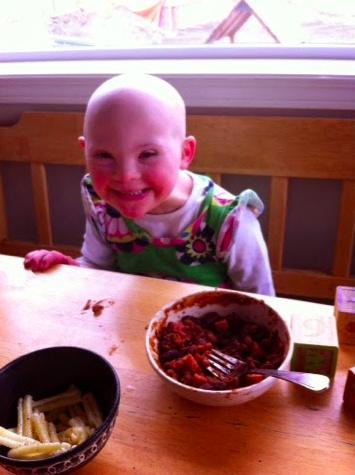As a parent, it never fails that our children’s eating habits come up as a topic of conversation. Someone on one of my online mom groups recently asked what other moms fed their kids for breakfast. Other moms wrote about strawberries and egg muffins, omelettes and oatmeal. Me? I wrote that my kid ate a granola bar and was too embarrassed to mention it was a chocolate-covered granola bar followed by pretzels.
That’s because I have a child with long-standing eating issues. Issues that make me silently roll my eyes when other moms say things like, “I don’t cater to my kids pickiness” or “I make one meal and they can eat it or starve” and the best line ever, “They’ll eat when they’re hungry.”
I know moms who say these things don’t understand the scope of some children’s food aversions and fears, and they definitely have never experienced them firsthand.
My daughter Phoenix’s eating issues have been present from birth. Even as a newborn she refused to breastfeed and instead preferred the ease of the bottle. Purees were all right, but mixed foods with some smooth bits and some lumps were a no-go. Although we introduced a variety of foods and textures, little progress was made in her eating.
We consulted with dieticians and occupational therapists, sometimes on a weekly basis. We tried a variety of foods, flavors and textures and finally found success with hard munchables like pretzels, rice crisps and veggie straws. We still consider veggie straws vegetables in this house. Vanilla yogurt has always been a safe food and continues to be a favorite to this day.
As Phoenix grew, it became clear her issues around eating weren’t limited to just skills. Phoenix has a deep and profound distrust and suspicion of food. Even at 5 years old, she scrutinizes each bite of food carefully, as if an errant piece of vegetable may contain the poison that will finally kill her.
As much as we would like our child to eat a variety of foods, we consider one fruit or vegetable a day a victory.
We joke that Phoenix is growing on a solid diet of air and sunshine. But she is growing and has followed her same growth and weight curve for a number of years now. She’s a fairly slim child, but she always has energy to play and learn, and her pediatrician isn’t worried about her growth.
I frequently hear other parents say, “I just make them eat,” and I always wonder: How? How do you make a child eat who won’t? We’ve tried putting food in front of her and not giving her anything else until she eats what’s on her plate. She will happily go without eating unless it is a food she deems acceptable.
Punishment also doesn’t work for helping her accept new foods. It actually makes the food refusal worse by associating eating time with tears, frustration, anger and unhappiness. We just cannot in good conscience make every mealtime a torturous experience for her by expecting her to eat like other children. There comes a time where you have to focus on the success of the child rather than society’s expectations of “healthy” eating.
The most success we’ve seen has been with bribery and other kinds of positive reinforcement. Her favorite food is ice cream cake, so in order for her to earn a piece, she needs to eat a small plate of dinner. Lately we’ve seen a higher acceptance rate with the promise of ice cream cake, but it’s not a guarantee. We don’t mind if she eats a piece every day because it’s a serving of dairy, and she is still on the thin side.
We also take a lot of time to praise her when she eats challenging foods or tries previously refused foods. Part of changing her food-refusal behavior is changing her self-perception of herself as an eater. We want her to see herself as a good eater who can try new foods — just like I try to encourage my students to think of themselves as good learners who can tackle new topics. The more we perceive ourselves as being competent, the more competent we become because we’re not afraid to take on new challenges.
I cook regular meals for the rest of the family, including our 16-month-old twins who are excellent eaters. If I know the meal is something Phoenix won’t eat, I gladly make a small portion of something she will eat, while encouraging her to try what the rest of us have. I do this because we need to continue to make mealtime a happy event for everyone and because my child needs to feel that we are working with her to support her (painfully slow) growth.
We also celebrate the successes as they come. Today Phoenix tried a grilled cheese sandwich. Last week she tried banana. The grilled cheese was swallowed and the banana was spit out. It’s all progress. And when I look back over the last three years, Phoenix has grown from eating maybe six foods including one fruit or vegetable, to eating a few vegetables, almost any protein, a variety of carbs and a few dairy products. That’s a huge gain and is a testament to the fact that our approach is working.
So that’s why I cater to my picky eater — because it’s the only way we’ve seen progress in her fear of food and eating. My longterm goal is to have her eat a variety of foods and for her to learn how to create a balanced diet. But for some kids, like Phoenix, you need to give them time and support to do that.
Follow this journey on Celebrating Phoenix.



